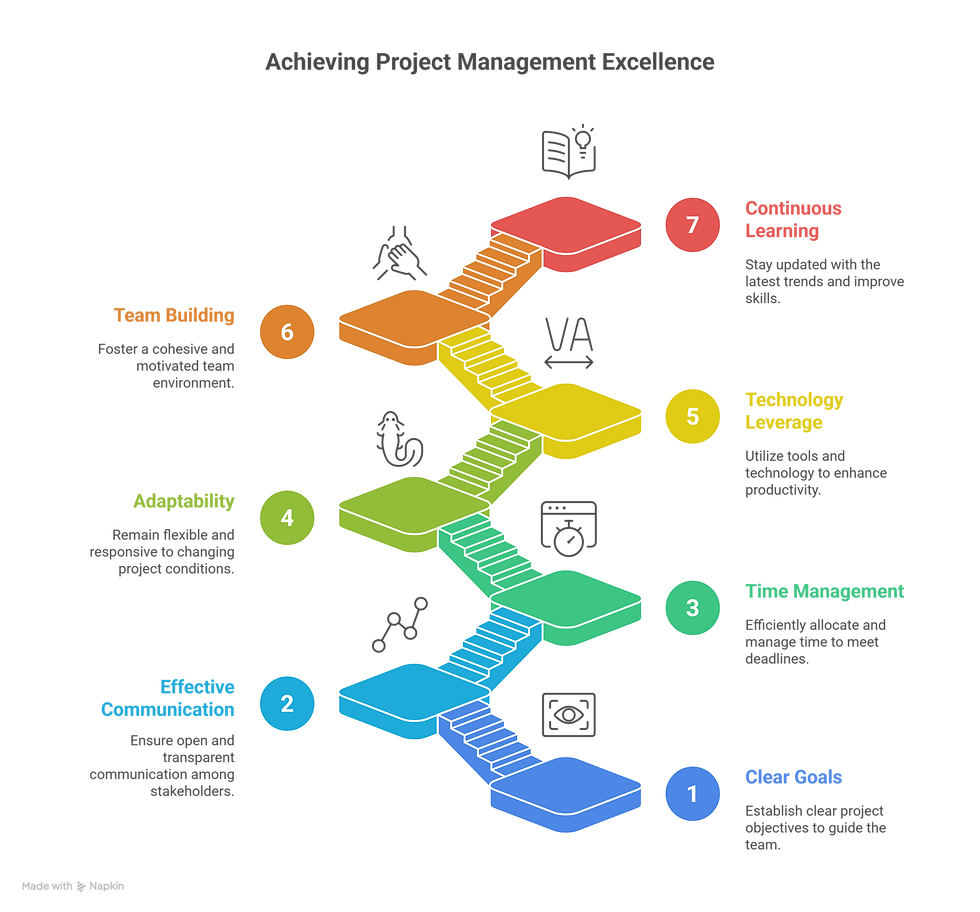7 Habits of Highly Effective Project Managers
- Yasir Ali Warraich

- Apr 25, 2025
- 6 min read
Updated: Nov 21, 2025
Every project manager starts with a deadline and a plan. But only a few become the type of leader whose projects always succeed — the ones who deliver faster, smarter, and with confidence. These PMs don’t only manage timelines — they drive transformation. They lead teams through chaos. They communicate clarity in confusion. And today, thanks to AI, they make better decisions with less effort.
So, what makes these project managers truly powerful?The answer lies in their habits — skills they follow every single day.
This article reveals the 7 habits that separate average project managers from the world’s most effective ones — powered by AI and modern technology like ClickUp. Whether you’re a beginner or a seasoned leader, these habits will upgrade your mindset, your workflow, and your professional success.
Why Habits Are Critical in AI-Driven Project Management
Project management is evolving. AI is no longer optional — it’s an integral part of every effective project. The habits of successful PMs now include how they interact with AI, how they use data, and how they manage teams in smart, automated workflows.
Strong habits in this context allow project managers to:
Use AI to predict risks and delays
Automate repetitive work and save time
Keep teams aligned across tasks and platforms
Make data-driven decisions rather than guesswork
Focus on strategic leadership rather than mundane tasks
How AI Has Changed the Role of a Project Manager
Traditional PMs spent most of their time on tracking spreadsheets, writing manual reports, and following up constantly.
Today, AI tools like ClickUp change the game:
Automated workflows handle recurring tasks
AI dashboards give real-time updates on progress
Task suggestions optimize workloads
AI communication assistants help streamline messaging
Predictive analytics prevent delays and overwork
Highly effective PMs now adopt habits that leverage AI, turning it into a partner, not a tool.
7 Habits of Highly Effective Project Managers

Habit 1: Clear Goal Setting and Prioritization
Every successful project starts with clear goals. Without a clear direction, teams can become disorganized, leading to missed deadlines and wasted resources.
How to Set Clear Goals
SMART Goals: Ensure your goals are Specific, Measurable, Achievable, Relevant, and Time-bound.
Communicate Effectively: Share goals with your team and stakeholders to ensure alignment.
Break Down Tasks: Divide larger goals into smaller, manageable tasks to make progress measurable.

Prioritization Techniques
Eisenhower Matrix: Categorize tasks based on urgency and importance.
80/20 Rule: Focus on the 20% of tasks that yield 80% of results.
Daily Stand-ups: Use short team meetings to identify and prioritize critical tasks.
Habit 2: Effective Communication
Communication is the lifeline of project management. Miscommunication can lead to errors, delays, and dissatisfaction among stakeholders.
Keys to Effective Communication
Active Listening: Pay attention to team members’ inputs and concerns.
Regular Updates: Provide consistent project updates through emails, meetings, or dashboards.
Clarity and Simplicity: Use simple language and avoid jargon to ensure everyone understands.
Best Practices
Use Visual Aids: Charts, graphs, and timelines make complex information easier to digest.
Feedback Loops: Create a culture where team members feel comfortable providing and receiving feedback.
Centralized Tools: Utilize tools like ClickUp to keep all communications and updates in one place.
Habit 3: Mastering Time Management
Time is one of the most valuable resources in project management. Managing it effectively can mean the difference between success and failure.
Time Management Strategies
Time Blocking: Allocate specific hours for different tasks or activities.
Pomodoro Technique: Work in focused intervals (e.g., 25 minutes), followed by short breaks.
Daily and Weekly Reviews: Assess progress and adjust plans to stay on track.
Tools and Techniques
Calendars: Use shared calendars to align schedules with the team.
Task Dependencies: Clearly define task dependencies to prevent bottlenecks.
Time Tracking Software: Monitor how time is spent to identify areas for improvement.
Habit 4: Adaptability and Problem Solving
Projects rarely go as planned. Effective project managers stay calm under pressure and adapt to changing circumstances.
Steps to Build Adaptability

Problem-Solving Techniques
Root Cause Analysis: Identify the underlying cause of issues.
Brainstorming: Engage the team in generating creative solutions.
Data-Driven Decisions: Use project data to guide your choices.
Habit 5: Leveraging Technology and Tools
The right tools can significantly enhance productivity and efficiency in project management.
Real-Life Example
Imagine managing a product launch. ClickUp allows you to create a detailed project plan, assign tasks, set deadlines, and monitor progress—all in one place. This ensures nothing slips through the cracks.
Habit 6: Building Strong Teams
Projects succeed or fail based on the strength of the team. Building a cohesive, motivated team is a critical skill for project managers.
How to Build a Strong Team
Define Roles Clearly: Ensure each team member knows their responsibilities.
Encourage Collaboration: Foster an environment where team members support each other.
Provide Resources: Equip your team with the tools and training they need.

Fostering Team Morale
Celebrate Wins: Recognize and reward achievements.
Open Communication: Encourage team members to voice their opinions and ideas.
Team Building Activities: Strengthen relationships through regular team-building exercises.
Habit 7: Continuous Learning and Improvement
The best project managers are always looking for ways to improve. Continuous learning ensures you stay ahead in a competitive landscape.
Ways to Continuously Learn
Stay Updated: Follow industry blogs, attend webinars, and take online courses.
Learn from Experience: Review past projects to identify successes and areas for improvement.
Seek Feedback: Regularly ask for input from team members and stakeholders.
Implementing Improvements
Retrospectives: Conduct project retrospectives to evaluate performance.
Adopt New Tools: Experiment with new tools like ClickUp to enhance efficiency.
Set Personal Goals: Work on developing skills like leadership, communication, or technical expertise.
ClickUp: The Ultimate Project Management Tool
After understanding the 7 habits of highly effective project managers.
The next question is: How do you put these habits into action efficiently?
ClickUp is an all-in-one AI-powered project management platform that helps project managers centralize work, track progress, and lead teams effectively.
From task management to performance tracking, ClickUp provides the tools to implement all seven habits without switching between multiple apps.
With AI at its core, ClickUp ensures managers spend more time leading and less time managing repetitive tasks.

Key Features of ClickUp
Task & Project Management
Organize tasks, subtasks, and checklists
Track deadlines and dependencies
Assign tasks to team members with clarity

AI-Powered Automation
Automate repetitive processes
Receive AI suggestions for task priorities
Predict risks and delays

Team Collaboration & Communication
Centralized comments on tasks
Chat views and notifications
Document sharing and note-taking

Dashboards & Analytics
Real-time performance metrics
Goals tracking
Productivity insights for continuous improvement

Integration & Flexibility
Connect with other apps
Custom workflows
Templates for repeatable projects

How ClickUp Helps Project Managers
Centralized Dashboard: Keep all project details in one place for easy access.
Custom Views: Switch between different views (e.g., Calendar, Gantt Chart) to suit your needs.
Seamless Communication: Use in-app messaging and comments to collaborate effectively.
Integration: Connect ClickUp with tools like Slack, Google Drive, and Zoom.
Templates: Use pre-built templates for project planning and task management.

Comparison with Other Project Management Tools
While many project management tools offer specific features, ClickUp stands out by combining comprehensive capabilities like team management, project planning, marketing, CRM, and operations in one platform.
Its AI integration goes beyond automation, providing analysis, predictions, and actionable suggestions to keep PMs proactive. With customizable workflows and scalability for freelancers, small teams, large enterprises, educational institutions, and NGOs, ClickUp delivers unmatched versatility.
Few tools match this combination of AI, flexibility, and depth, making ClickUp the preferred choice for highly effective project managers.
Here's the full Comparison of ClickUp with other tools.
Conclusion
Highly effective project managers are not born — they are shaped by habits, insights, and the tools they use. By mastering communication, planning smartly, tracking performance, managing risks, motivating teams, leveraging technology, and reflecting continuously, PMs set themselves apart.
AI now amplifies these habits, allowing project managers to focus on strategy, leadership, and innovation rather than repetitive tasks. ClickUp serves as a central platform to implement all these habits efficiently, combining task management, team collaboration, analytics, and AI-powered automation in one place.
For anyone serious about project management, adopting these seven habits and leveraging ClickUp is the path to consistent success, smarter workflows, and stronger teams.
Got questions or ideas? I’d love to hear them – book a free session and let’s explore together.



Comments